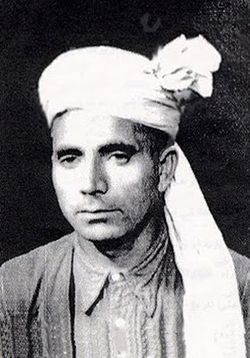- Malang Jan
-
Malang Jan
ملنګ جان
Malang Jan BabaBorn Mohammad Amin
1914
Bihsud District, Nangarhar, Afghanistan
AfghanistanDied 1957
Latabaan highway, between Kabul and Nangarhar, Afghanistan
AfghanistanCause of death Bus crash Resting place Jalalabad, Nangarhar,  Afghanistan
AfghanistanNationality  Afghanistan
AfghanistanOther names Malang Jan Baba Ethnicity Pashtun Citizenship  Afghanistan
AfghanistanKnown for Poetry Salary 500 Afghanis Title Baba Religion Sunni, Muslim Children 1 Boy Daud Jan and 1 girl Website http://www.malangjan.com Malang Jan (Pashto: ملنګ جان - b:1914, d:1957) was a prominent poet of Pashto language[1]
Contents
Early life & education
Malang Jan was born as Mohammad Amin in Bihsud District of Nangarhar Province, Afghanistan. When he was only 3 years old, his father, Abdul Shakoor died. He was 15 years old when he along with his family moved to Kama District in search of work. Few years later he went to Jalalabad to serve his 2 years military service. After completing his term in the military, he moved back to his home village to earn a living. While he was in his early twenties, his first poem was published in Etihade Mashraqi magazine. From there on he found fame and became one of the renowned poet of his time.[1]
Work and adult life
In 1945, he was invited to Kabul by Mohammad Daud Khan and in 1950 Prime Minister Shah Mahmud Khan allocated him 600 Afghanis as yearly pension. In 1953 he was re-invited to Kabul and appointed him as the manager of Pashto Music at Kabul Radio. Since he was illiterate, Daud Khan appointed him a personal teacher for six days. Within those 6 days he learned enough so he could write and read his own poetry.[1]
While traveling back to his home village in 1957, he and his only son, Daud Jan died in a bus accident.[1]
Poetry collections
- "Khwagay Naghmay"
- "De Watan De Meenay Kajkol"
References
Categories:- Afghan poets
- Pashto poets
- Pashtun people
- People from Nangarhar Province
- 1914 births
- 1957 deaths
- Afghan people stubs
Wikimedia Foundation. 2010.
